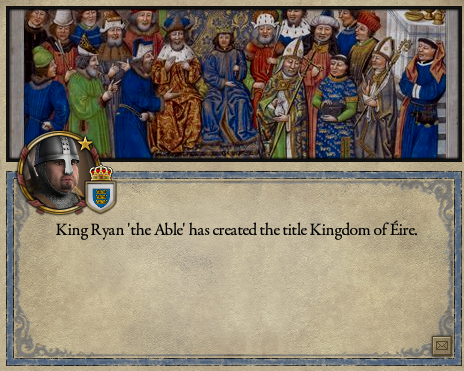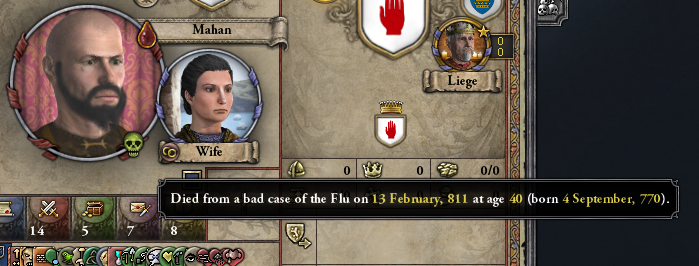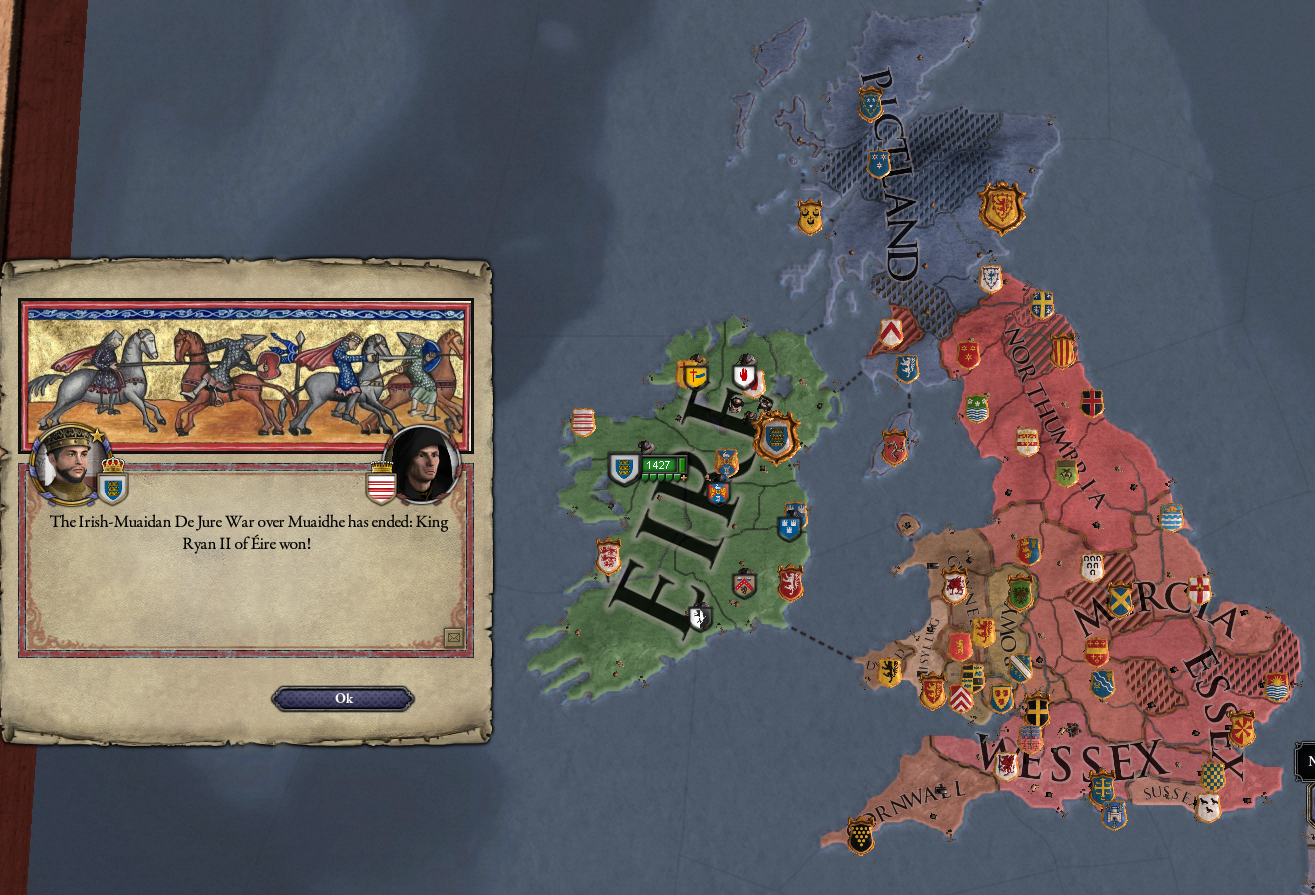Chapter 12: On Thee, Our Hopes We Fix
Eanhere woke up from the most wonderful dream. He dreamt that he was a king.
This alone didn’t mean too much. Even after he woke, he was still the King of England, for whatever that honor was worth. In the dream, he was king over all the Isles. England, Scotland, Wales … even Ireland. He strained his head, trying to remember as many details in the dream as possible, when he remembered a crowd of protesters. Irish protesters. The Irish were angry about the English taking over their land! Ridiculous. How did he not realize it was a dream until he woke up?
But his imagined rule extended far beyond the Isles. In his dream, Eanhere controlled more land than Alexander and Trajan, combined and tripled: the largest empire of all time. He ruled much of the Middle East, still under the rule of the Abbasid Caliphate in the waking world. He ruled Egypt, and Nubia, and even the uncharted southernmost depths of Africa. He ruled the distant kingdoms of India, known to him and all his subjects only by vague reputation. He even controlled lands in distant unknown continents, the fictional product of a sleeping imagination.
A moment later, another detail of the dream hit him: there was a song. A song his millions of subjects would sing to honor him. There were lyrics to it … what were they? Were they even real words at all, or perhaps the same nonsense he saw when he attempted to read in a dream? The lyrics were lost, but the melody still lingered in his head:
Hmm-hmm-hmm-hmmhmmhmm…
“Daddy! Daddy!” shouted young Princess Sigrid as she ran into the room. “Wake up! Wake up!”
“I’m up, dear, calm down.” King Eanhere lifted his daughter up onto the bed, careful not to place her too close to her still sleeping mother.
“It’s Gorgeous Day! It’s Gorgeous Day!”
“It is a gorgeous day, isn’t it?” The king looked at the rising sun out the window.
“No, no, Daddy! It’s Gorgeous Day!” The realization hit the king. It was April, wasn’t it?
“The festival is today, Daddy! You’ll take me, won’t you? Please?”
“Don’t I always?” the king said with a laugh. “Come on, now, wash up and we’ll be off.”
The streets of Lundenwic were stuffed with villagers, laughing and dancing with glee, oblivious to what lay outside their walls. The royal family paraded the roads, accompanied by a sizable escort of armored soldiers. Eanhere waved to the crowds, attempting the most earnest smile he could. As far as his subjects were concerned, there was no reason to not be happy today, and as their king he had an obligation to pretend that was so. In the back of his head, the song from his dreams kept repeating:
Hmm-hmm-hmm-hmmhmmhmm…
“Daddy?” whispered Sigrid, tugging at the sleeves of her father’s robe. “Why do we have Gorgeous Day?”
“You asked me that last year, didn’t you?”
“Well, I want to know again!”
“Just tell her the story,” whispered Queen Aethlthryth through the teeth of her smile. “She’ll be begging all festival if you don’t.”
“Well, if it would please my liege,” said the king with a mock bow, as his daughter laughed. “It isn’t Gorgeous Day, dear. It’s George’s Day. Saint George’s Day. We hold it to celebrate Saint George.”
“And who is he?”
“He’s the patron saint of England! Who God has protecting us all. He was a Roman Christian soldier, who was persecuted for his…”
“I want to hear about the dragon, Daddy.”
“I could have guessed. Well, one day Saint George was visting Libya…”
“Where’s that?”
“Libya? Oh, I don’t know … somewhere in Africa, I think?”
“I thought he was the hero of England, Daddy.”
“All right, fine, have it your way. Saint George was visiting England, when he found a village terrorized by an evil dragon…” With the word, King Eanhere’s mind began to wander. He thought of his own dragon: Emperor Conri of Eire, the newest leader in the long campaign of British conquest.
Conri didn’t look like a dragon, of course, though he hardly looked like a human being either. When a plague of consumption overcame Eire, the stricken emperor was left at the mercy of an incompetent physician who could think of no solution beyond repeated amputations.
An eye was the first to go. Conri didn’t mind this so much. Indeed, he took his new resemblance to Odin in stride. But the disease persisted, and with it left a leg, then an arm, and by then the emperor was half gone.
The one comfort of his injuries was that Conri frightened his enemies as much as his own court. With every raid he committed against England, rumors soon spread of cities falling to the Metal King, outfitted in so many prosthetics he seemed like a machine, a weapon of war in his own right.
“Daddy?” asked Sigrid. “Are you going to finish the story?” Eanhere returned to the present, still waving to the crowds without even realizing.
“Right, of course. Sorry, dear. So, the villagers thought they could make the dragon happy with sacrifices. Every day, they’d send somebody for the dragon to eat so he’d leave the rest of the village alone...” Once more, the king’s thoughts shifted to Eire. Conri didn’t have the means, financial or diplomatic, to bring about the full-scale invasion of England he dreamed of. Instead, the dragon settled for small offerings, seizing a new county every half a year or so.
“I don’t get that part, Daddy. Even if the dragon eats them one at a time, after a while wouldn’t he eat everyone anyway?” The girl had a point, the king realized. Conri’s conquest of England may have been slow, but the results were already visible. Eire now controlled the entire duchies of Cornwall and Wessex, with the capital itself bordering the now-Irish counties of Oxford and Winchester.
It wouldn’t be right away, maybe not even in Eanhere’s lifetime, but if it kept up for long enough, the dragon would indeed swallow up all of them. And yet all throughout Lundenwic, everyone celebrated as gleefully as they had in all the years before. Bless the poor bastards, he thought. The water was rising so slowly that nobody had any idea they were drowning.
“Well … well luckily they stopped the dragon before it came to that, sweetie. You see, the day St. George came, they were about to sacrifice the mayor’s own daughter.”
“Come on, Eanhere,” whispered the queen. “You’re going to give her nightmares with this sort of talk.”
“So … a princess, then?” asked Sigrid.
“No, not a princess, the mayor’s daughter, she was…”
“...like me?” With that, the most repulsive image entered the king’s head. He saw his own daughter, chained to a tree and dressed in a bridal gown. A gruesome, slavering dragon crawled towards her, an army of unwashed Irish barbarians following shortly behind.
“...No, not like you, Sigrid. I’ll never give you to the dragon. I’ll die before I do.” The princess took a step back, eyeing her father with confusion. A few spectators still applauded the royal family, but slightly slower than before. Why had the king stopped smiling?
“...But the dragon is gone, Daddy,” said Sigrid with a nervous laugh.
“I wish, but no, it’s not.”
“Uh … yes it is. St. George stops him, remember?”
“Oh, right! Yes, of course, the story… well, Saint George finds the princess, and when the dragon shows up to eat her, he sticks it with his lance!” The king mimed a jab as his daughter laughed, in imitation of the brave warrior he wished to be.
“And he kills the dragon, right?”
“Not yet, no. He ties the dragon up and carries it into the town square. He says he’ll kill it right there if the whole village was baptized. They agree, of course…”
“Of course,” he repeated in his head. Because who wouldn’t accept Christ after a visit from a living saint? In the present day, conversions didn’t seem to come nearly as easily. As the time traveler’s pagan kingdom grew, many a missionary had traveled to Airgialla in hopes of saving their souls, from England, France, and even Rome itself.
Every time, the result was the same. As soon as word of the priest’s arrival had reached Conri’s ears, they would be locked in his dungeons, with no hope of poisoning the minds of Eire. After a while, they would be held for ransom, then sent back to wherever they came from, shaken yet unharmed. Strength, but not cruelty.
The Saracens fared no better, as an Andalusian imam learned when he came to Eire with the teachings of the Prophet. Jesus and Muhammad alike seemed helpless in convincing the new empire to abandon their idols. Theirs was a kingdom in which truly nothing was sacred.
“And once they’d all converted…” The king raised his arm up into the air. He could almost feel the hilt of the sword in his hands. “Whoosh! He sliced the dragon’s head clean off!” Sigrid laughed and clapped to herself at the hero’s triumph.
“So Saint George saved the princess, then,” she said.
“Well, he was only there because God knew he needed to be. God saved the … king!”
“I thought we were talking about the princess, Daddy.”
“No, no, I mean the song! That’s how the song went! ‘God save the king!’”
“What song?” The king didn’t bother with an answer, too busy replaying the song in his head.
Hmm-hmm-hmm-hmmhmmhmm, something something something, God save the king. That was part of the dream, he was sure of it.
“...Are you all right, Daddy?” asked Sigrid. In an instant, the king returned to his senses and noticed his daughter looking up at him with concern.
“...Uh, yes, of course I am. Come along now, dear. There’s still so much of the festival to see!” With that, the king tried to put the thoughts of Irish invasion and strange dreams to rest, enjoy the moment with his family. The thoughts still lingered in his head, though. They always did.
Before too long, night fell, and the royal family had returned to the safety of their keep. Princess Sigrid thought of Saint George, whisked to sleep by images of knights and dragons. Queen Aethlthryth thought of England, and not in the way she usually did, as she recalled the day’s festivities. King Eanhere, however, tossed and turned in his bed, tormented by thoughts of Conri. God had helped England’s patron saint triumph against a monster. Where was God for England now?
Even when, despite his torment, sleep finally overtook him, he felt no better. Afterwards, he found himself inside a palace far more decadent than his own, wearing strange clothing unlike any he had seen in his life. The dream from before had returned.
All night long, he heard advisors of another age and world discussing the news of his glorious empire, filled with names and terms he couldn’t understand. “The President of the United States is on the telephone … the Soviet Union has tested a hydrogen bomb … President Jiang wishes to talk about Hong Kong…” It was confusing, yet at the same time blissful, the idea that his own kingdom could ever be so large.
As the sun drew closer, the dream ended just as it had the night before. A choir of loving, devoted subjects singing the same song in his honor:
God save our gracious king! God save our noble king! God save the king!
Then Eanhere opened his eyes. Back to reality, back to an England that doesn’t even control all of itself, let alone lands beyond. Back to meetings with his council to discuss defensive plans for the next Irish invasion, destined to fail as badly as all those before. His dreams of an all-powerful England was lovely, but in the end that was all they were: dreams.
The dream replayed the next night, and the one after that. Night after night, for months, that was all he knew. The king began to dread sleep; though his dreams were pleasant, the return to the world of the waking, the reminder that his fantasies were never meant to be, grew maddening.
It was February now. King Eanhere II had heard the same song in his dreams every night for ten months straight now. As his council spoke, he said little, just stared at the wall in front of him with a dazed glare. The more he slept at night, the more tired he was in the day.
“Next item on the list, Emperor Conri has accepted our latest terms of surrender,” announced the king’s chancellor. “Peace has been restored in exchange for the Isle of Wight.”
“Wight, eh…” The king slumped deeper into his seat. “They really can’t leave anywhere alone, can they?” Though he was awake, the choir still sang in his mind, reminding him of what could never be.
“Finally,” added the steward, “preparations are underway for this year’s Saint George’s Day celebration. We’ve found a local theater troupe willing to perform a play on Saint George and the Dragon. They’ve built this giant leather dragon that multiple men get underneath … it’s quite fun.”
“Sure, seems nice…” mumbled the king.
“The best part is, the dragon looks like a giant snake, just in case!”
“Just in case?” Eanhere repeated. “What do you mean?”
“Well…” The steward tugged at his collar, avoiding eye contact with his liege. “If … circumstances were to ever make our celebrations … inappropriate.”
“What kind of circumstances?”
“Oh, any kind. Weather, disease, dragon attacks … the whole play would require only minor rewrites to change it from ‘Saint George and the Dragon’ to…” The king was staring at the steward now with a silent fury none of his council had ever seen before. “...‘Saint Patrick and the Snake.’”
“I can’t believe it,” answered the king’s marshal. “Do you know how much of an insult it is to even suggest something like that?”
“Yes! Thank you!”
“The Irish have their own gods now, remember? When they take over…”
“When?”
“...if we put on a play about Saint Patrick for them, they’ll have our heads!”
“Well, they’ve got some giant snake they believe in, don’t they?” added the spymaster.
“Oh, right, the Midgard Serpent,” said the chaplain.
“Well let’s just make the new play about that somehow.”
“Hey, what if instead of a lance, Saint George had a hammer?” asked the chancellor. “Then he could be Thor!” The whole council nodded in agreement, leaving the king to stare at them all, speechless. Only in his dreams was there any hope for England.
Send him victorious! Happy and glorious! Long to reign over us, God save the king!
“Daddy! Mommy! It’s time for breakfast!” shouted Sigrid as she skipped into her parents’ chamber. “Come on! They made cake!” She opened the door to see only her mother in the bed alone.
“Mmgh … I’ll be there in a minute, dear” the queen mumbled, still half-asleep.
“Where’s Daddy?”
“Probably passed out at his desk, I’d bet. Go get him for breakfast, would you?” Sigrid nodded, then ran through the halls of the castle, arms stretched out and laughing to herself the entire time. She would have walked slowly, had she known she’d never experience a moment so carefree again.
The study door creaked open. As the queen had predicted, King Eanhere was slumped over the desk, as he’d been found many mornings before.
“Daddy! It’s time for breakfast!” Normally the sound of his daughter’s voice was enough to wake the king, though this time there was no response. “Come on, Daddy! Aren’t you hungry?” Sigrid poked her father’s shoulder. Still no acknowledgement. “...Daddy?”










































